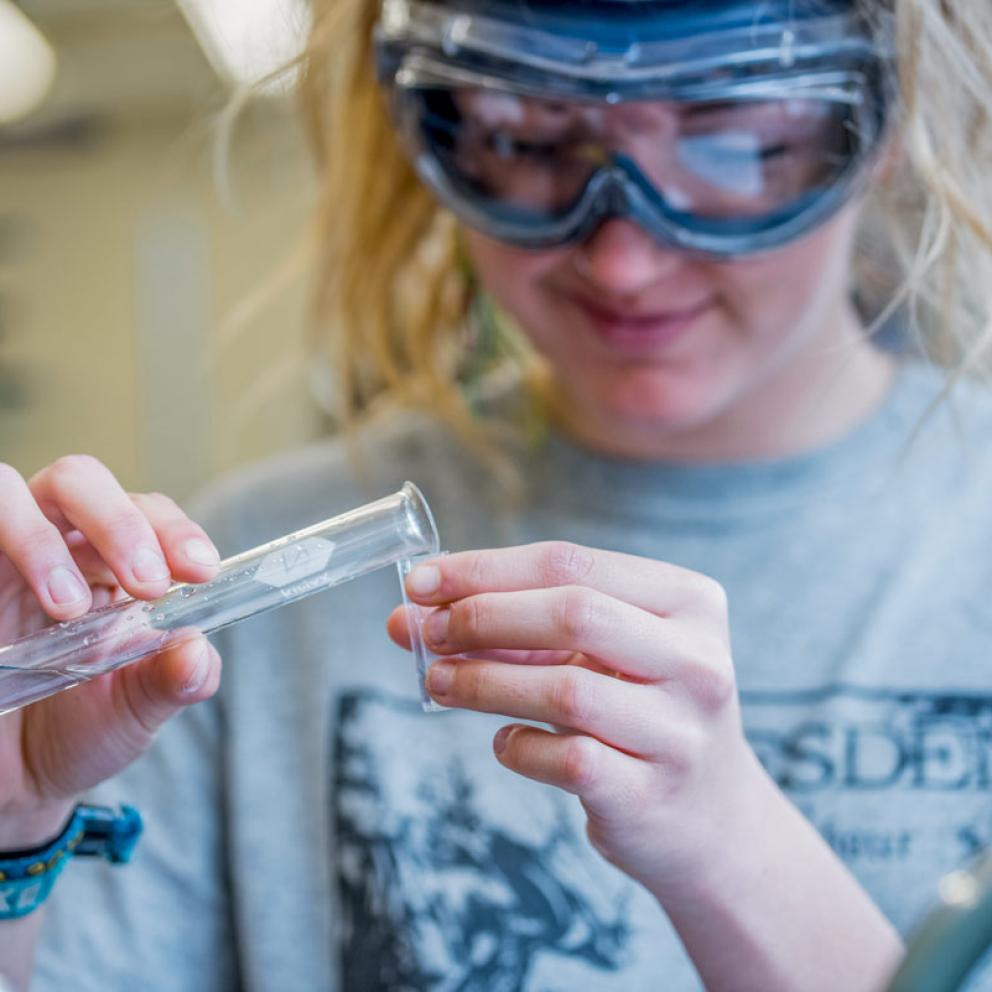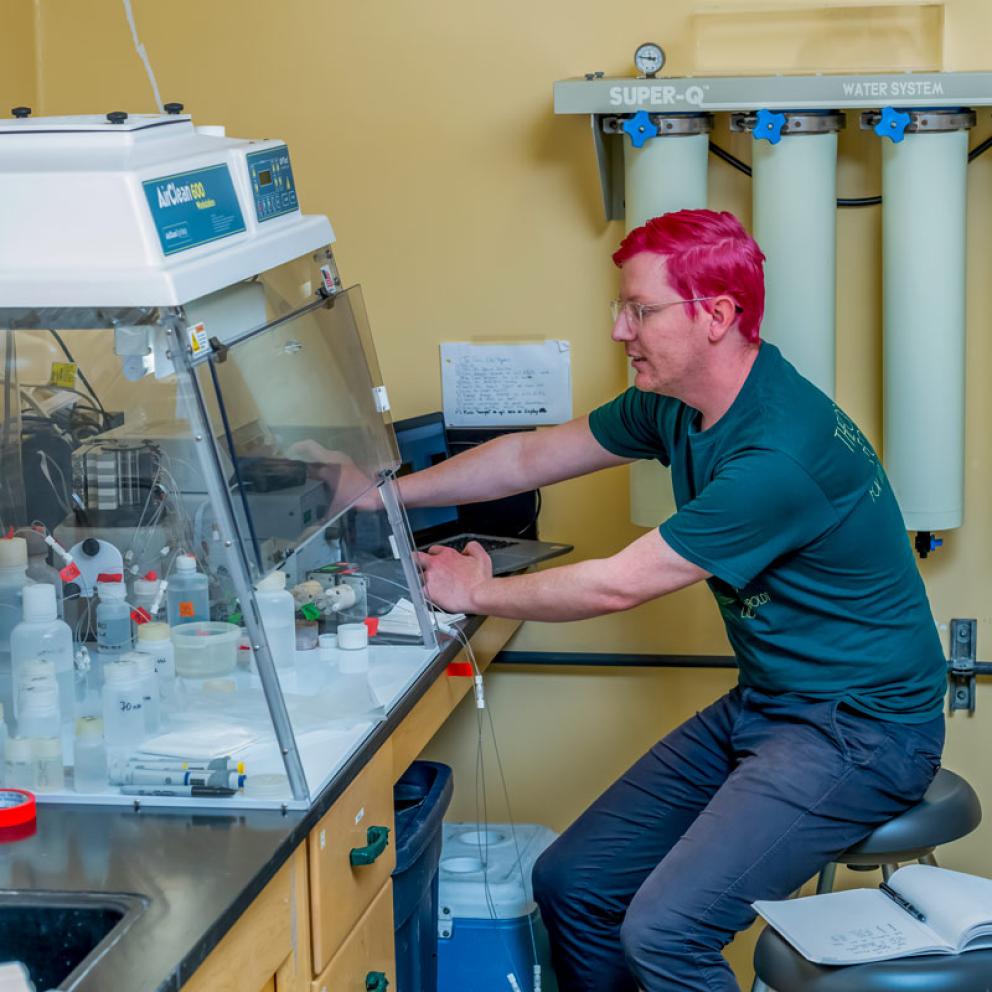Breadcrumb
Department of Chemistry & Biochemistry
Hands-on learning forms the basis of our program. In our close-knit classrooms, you’ll get to know your professors and get real-world experience and first class instruction. And you’ll connect with your fellow students in ways you wouldn’t at other universities. Our instruction and facilities are top-notch, and are all available to undergraduate students.
First-year Learning Community
As a Chemistry major, you will participate in a free science program called Stars to Rocks. For your first year, you’ll join a tight-knit group of peers and teachers in a cross-disciplinary learning community with Physics & Astronomy and Geology majors. You will explore the interdisciplinary nature of your major, and how you can not become an expert in one without understanding the others. Physics describes the forces acting in our universe, shaping the chemical reactions that form the geological matter of our planet.
Degrees & Programs
The Department of Chemistry & Biochemistry offers a Bachelor of Arts and a Bachelor of Science in Chemistry, a Bachelor of Science in Biochemistry and a minor in Chemistry.
Bachelor of Arts in Chemistry
The B.A. degree provides less specialization in chemistry and greater opportunity for studies in other fields. This curriculum is recommended for those who wish to obtain a Standard Teaching Credential with Specialization in Secondary Teaching, students who wish to add a second major, and students switching from majors with different core courses from the B.S.
Bachelor of Science in Chemistry
This B.S. is a rigorous program that fulfills the requirements for professional training established by the American Chemical Society, a national certifying agency. It is designed for students who will seek research positions in industry and governmental agencies and also prepares students who intend to continue study into the graduate level.
Bachelor of Science in Biochemistry
This B.S. is a rigorous program that prepares students for careers in biochemistry and various related fields. It fulfills the requirements for professional training established by the American Chemical Society, a national certifying agency. It is designed for students who will seek research positions in industry and governmental agencies and also prepares students who intend to continue study into the graduate level.
Minor in Chemistry
Many students majoring in Biology, Cell and Molecular Biology and Microbiology as well as Environmental Science, Engineering, Oceanography and Physics opt to enhance their degrees with a Minor in Chemistry.
Minors
Hands-on Learning
At Humboldt, you gain real-world experience and learn by doing—in the classroom, in the labs, and in the field.
We have a wide range of laboratory instruments for use in the classroom as well as students’ independent study. These facilities are research grade, and give you the experience of working in real-world, professional settings—a major leg up for students looking for a satisfying career. And the Department of Chemistry shares facilities with the entire College of Natural Resources & Sciences, giving students opportunities for a broad, well rounded education.

Small Class Sizes
Our small class sizes and experienced instructors provide a meaningful education, and you’ll gain support from your fellow students. You’ll get to know your peers in the first-year Stars to Rocks place-based learning community, which will familiarize you with Humboldt and the chemistry department, and probably introduce you to lifelong friends.
Our learning communities are shown to improve student success and a sense of belonging. Being connected to your community makes you more prepared for college and what comes after.

A Career Path
Chemistry students with additional skills or a highly specialized emphasis have special advantages in the job market. By looking into what course work, skills, and experiences an employer looks for, students can better prepare for forthcoming position openings.
We have active undergraduate research programs where you have the opportunity to specialize in a particular area of chemistry. The research areas include: biochemistry, physical chemistry, molecular modeling, inorganic chemistry, organic chemistry, organometallic chemistry, floral-scents, molecular electronics, marine chemistry, aqueous chemistry, trace metal analysis, and atmospheric chemistry.
These curricula are designed to prepare students for research positions in industry and governmental agencies. The B.S. degree also prepares the student who intends to continue their study into the graduate level. The B.A. degree provides less specialization in chemistry and greater opportunity for studies in other fields. This curriculum is recommended for those who wish to obtain a Standard Teaching Credential with Specialization in Secondary Teaching.
This is the type of program that sets you up for success and a fulfilling career.

Featured Alumni Profile
Achievements
Find out what our students, faculty, and staff are being recognized for.
Joshua Smith
Chemistry
Chemistry & Biochemistry faculty Joshua Smith is a co-author on a paper with an international team working on using triplet state Baird-aromaticity in photosensitive processes. In this study triplet state Baird-aromaticity is used to stabilize the quencher molecules used in fluorescence imaging. The paper was published in the Royal Chemical Society's open access journal, Chemical Science.
Bakouri, O. E.; Johnson, M. A.; Smith, J. R.; Pati, A. K.; Martin, M. I.; Blanchard, S. C.; Ottosson, H. Search of Improved Triplet-State Quenchers for Fluorescence Imaging: A Computational Framework Incorporating Excited-State Baird-Aromaticity. Chem. Sci. 2025. https://doi.org/10.1039/D5SC01131K.
Claire Till, Matthew Hurst, Ben Freiberger
Chemistry
Chemistry faculty Claire Till and Matt Hurst, along with alumni Ben Freiberger, led a paper just published in the Journal of Geophysical Research: Oceans. This paper came from their fieldwork at sea off the coast of California and Oregon, and is compares the chemical reactivity and distribution of the essential nutrient iron with a potential tool to study it: scandium
Till, C.P., Hurst, M.P., Freiberger, R.B., Ohnemus, D.C., Twining, B.S., Marchetti, A., Coale, T.H., Pierce, E. (2025). Contrasting the marine biogeochemical cycles of iron and scandium in the California current system. Journal of Geophysical Research: Oceans, 130(4), doi:10.1029/2024JC022087.
https://onlinelibrary.wiley.com/share/author/UKXCXGUBBP3U4KJWPE4Q?target=10.1029/2024JC022087
Hanna D. Hobbs, Lowen M. Hobbs, and Robert W. Zoellner
Chemistry
Two former undergraduate research students, now both in the U. S. Coast Guard, Hanna D. Hobbs and Lowen M. Hobbs, have published a peer-reviewed research article with Professor Emeritus Robert W. Zoellner entitled "The limits of copper oxidation states from density functional theory computations: Fluoro-copper complexes, [CuFn]x+, where n = 1 through 6 and x = 3+ through 5-". The citation is Hanna D. Hobbs, Lowen M. Hobbs, Robert W. Zoellner, Computational and Theoretical Chemistry 2024, 1242, 114942 (12 pages), to be published in December 2024.









